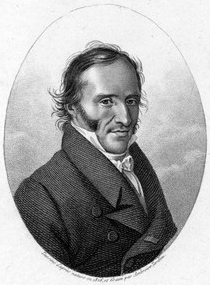Frédéric Cuvier facts for kids
Quick facts for kids
Frédéric Cuvier
|
|
|---|---|

Portrait by Ambroise Tardieu
|
|
| Born | 28 June 1773 Montbéliard, France
|
| Died | 24 July 1838 (aged 65) Strasbourg, France
|
| Awards | Member of the Royal Society |
| Scientific career | |
| Fields | Zoology |
| Institutions | Muséum d'Histoire Naturelle |
| Author abbrev. (botany) | F.Cuvier |
| Author abbrev. (zoology) | F. Cuvier |
Georges-Frédéric Cuvier (born June 28, 1773 – died July 24, 1838) was a French scientist. He studied animals (a zoologist) and ancient life forms (a paleontologist). He was the younger brother of another famous scientist, Georges Cuvier.
His Work and Discoveries
Frederic Cuvier worked at the Muséum d'Histoire Naturelle in Paris. From 1804 to 1838, he was the main keeper of the menagerie. A menagerie is a place where wild animals are kept, similar to a zoo.
In 1825, he gave the red panda (Ailurus fulgens) its scientific name. This animal is known for its reddish-brown fur and long, bushy tail.
A special position was created for him at the museum in 1837. This was the chair of comparative physiology. This means he studied how the bodies of different animals work and compare to each other. In 1835, he became a foreign member of the Royal Society, a very important scientific group.
Frederic Cuvier's work was noticed by other famous people. Charles Darwin, who wrote On the Origin of Species, mentioned him. Darwin noted Cuvier's studies on animal behavior and instinct. He looked at the difference between habits animals learn and instincts they are born with.
Cuvier was also mentioned in Moby-Dick by Herman Melville. In this famous book, Cuvier is noted for his writings about whales.
Ideas on Animal Change
Frederic Cuvier was one of the first scientists to use certain words in biology. In 1807, he used the term "héréditaire" (hereditary). In 1812, he used "heredity". These words describe how traits are passed from parents to their children.
He believed in something called the inheritance of acquired characteristics. This idea suggests that animals could pass on traits they developed during their lives to their offspring. He based these ideas on his studies of how animals behave.
Even though he supported the idea of acquired characteristics, he did not believe that animal species changed their basic body shapes over time. This was similar to his brother's views. However, he did think that animal behaviors could change. He believed these changes happened because of what animals needed in their environment.
A historian named Robert J. Richards described Cuvier as a "behavioral evolutionist." This means Cuvier focused on how animal behaviors changed over time, even if he didn't think their physical bodies changed much.
Selected Books
Frederic Cuvier wrote several important books about animals:
- Histoire naturelle des mammifères (Natural History of Mammals) (4 volumes, 1819–1842) – He wrote this with Étienne Geoffroy Saint-Hilaire.
- De l’histoire naturelle des cétacés (On the Natural History of Whales and Dolphins) – Published in Paris in 1836.
See also
 In Spanish: Frédéric Cuvier para niños
In Spanish: Frédéric Cuvier para niños
 | Emma Amos |
 | Edward Mitchell Bannister |
 | Larry D. Alexander |
 | Ernie Barnes |

